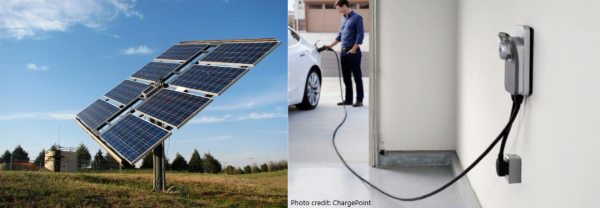
As we close out another year, we are happy to report on the continued progress being made in Connecticut. Thanks to your support, the transition to a clean energy economy continues to accelerate each year!
From purchasing an electric vehicle, to installing solar panels, to taking advantage of a battery storage system, there are more opportunities than ever to benefit from clean renewable energy. Read on for highlights from some key state programs and administrative dockets.
Shared Clean Energy Facilities (SCEF) Program
The SCEF program (aka shared solar) continues to perform well, with nearly full participation in the annual solicitations. Over the course of the first 3 years, the program has contracted for 71.848 megawatts of solar and fuel cell projects, enough to power nearly 16,000 homes. Beginning in 2023, the program capacity will double from 25 MW to 50 MW annually and any shortfall in one year will be rolled over into the following year’s capacity. This means even more opportunities for low-income customers and households in state-identified environmental justice communities to benefit from SCEF projects.
Electric Vehicle Charging Program
The EV charging program continues to evolve, as PURA expands the residential managed charging incentive program into a year-round program (from a summer -only program). The residential EV Charging program provides residential incentives of up to $1,000 for the purchase and installation of a networked EV charger, with recipients participating in a managed charging program that rewards customers for modifying their charging behavior at certain times to help to reduce the load on the grid. The program also provides incentives for the installation of public “destination” and fast-charging chargers. Interest in the commercial program has been very strong with program performance exceeding expectations resulting in a doubling of public charging infrastructure deployment targets to 25,552 charging ports by 2025.
Residential Renewable Energy Solutions (RRES) Program
The RRES program has also seen strong performance and is on track to approve 81.4 MW of residential projects in the first year of the program. Although the overall program performance has been strong, the program is falling short of achieving its benchmark of 40% low-income customer and EJ community participation. Accordingly, PURA has increased the incentives available to low-income customers and customers living in EJ communities to increase participation. Additionally, PURA continues to explore program design changes that will enhance the “solar plus storage” options available to residential customers. Beginning in January 2023, affordable housing facilities with individually metered customers will be able to participate in the RRES program with the financial benefit of the solar installation spilt equally between the tenants and owner.
Non-Residential Renewable Energy Solutions (NRES) Program
The General Assembly doubled the annual NRES program capacity for commercial solar projects from 50 MW to 100 MW and allowed for the “oversizing” of rooftop system to take full advantage of the capacity of non-residential rooftops to support solar siting. In the first year of the program. In recognition of changes to the federal solar Investment Tax Credit, requiring a project labor agreement for projects 1 MW or greater, PURA modified the applicable size categories for projects establishing a new medium category for project’s between 200kW and 1 MW and a new large project category for projects equal to or greater than 1 MW. As with the SCEF program, unallocated MW capacity in a given year will be added to the following year’s available capacity, accelerating the growth of renewables in Connecticut.
Energy Storage Solutions (ESS) Program
Connecticut has established a goal of deploying 1,000 MW of energy storage projects by 2030. To support fulfillment of this goal, PURA has established the ESS incentive program to achieve 580 MW of this goal, including 290 MW of dedicated residential storage capacity. Residential customers are eligible for an upfront incentive based on the size of the storage system, with higher incentives for low-income customers and systems installed in underserved communities. Customers also receive performance-based payments for the storage systems contribution to managing summer and winter demand peaks. While deployment of residential storage systems under the ESS has been slow, this may be due to an older competing program, “Connected Solutions” offered by the utilities as part of the state’s conservation and load management programs. While 184.5 kW of residential energy storage has been approved through the ESS program since the beginning of the year, 951 kW of storage was approved through Connected Solutions — despite the fact that customer incentives are higher through the ESS program, while also providing the greatest benefit to the general public at the lowest cost. DEEP has recommended winding down the Connected Solution’s program, which should result in more robust participation in ESS with greater customer and ratepayer benefits.
Low Income Discount Electricity Rate
To help households struggling with energy bills and with a goal of reducing energy burdens to below 6% of household income, PURA established a two-tier low-income discount rate for households at varying income levels. The program, which will be fully rolled out in January 2024, provides either a 10% or 50% bill discount for the first 800 kWhs of electricity consumed each month (1,200 kWs for households with electric resistance heating), with eligibility caps set at 60% of state median income and 160% of federal poverty guidelines, respectively.
Together, improvements like these will reduce climate pollution, create cleaner jobs, make our electric grid more resilient and flexible, and save money for families.
And you helped make them possible. Thank you!
